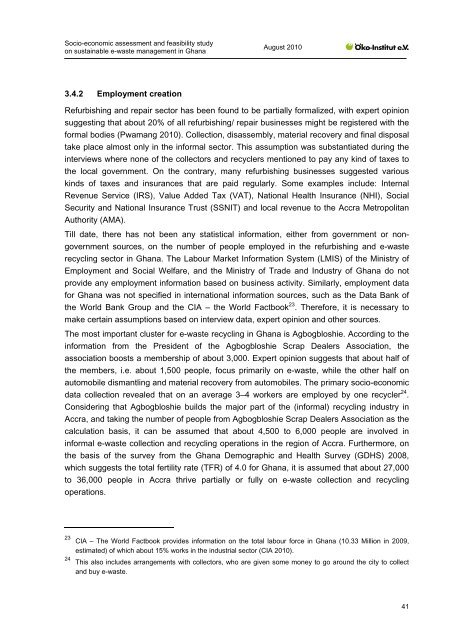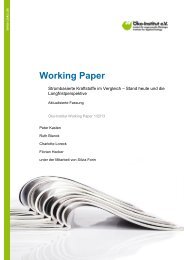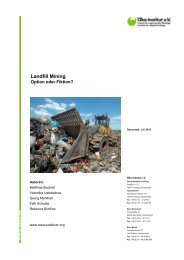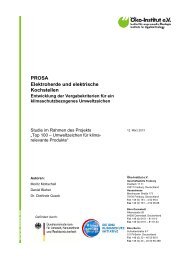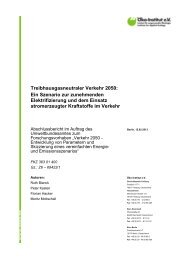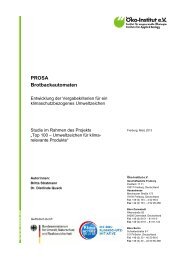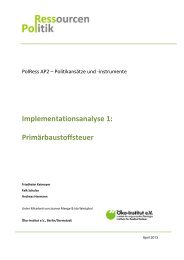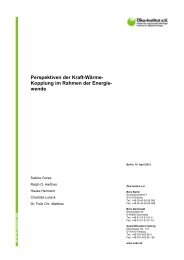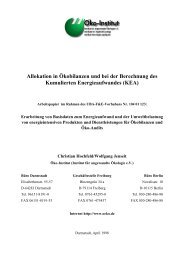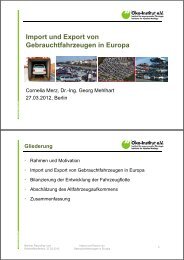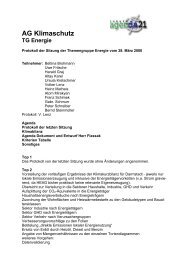Socio-economic assessment and feasibility study on - Öko-Institut eV
Socio-economic assessment and feasibility study on - Öko-Institut eV
Socio-economic assessment and feasibility study on - Öko-Institut eV
Create successful ePaper yourself
Turn your PDF publications into a flip-book with our unique Google optimized e-Paper software.
<str<strong>on</strong>g>Socio</str<strong>on</strong>g>-<str<strong>on</strong>g>ec<strong>on</strong>omic</str<strong>on</strong>g> <str<strong>on</strong>g>assessment</str<strong>on</strong>g> <str<strong>on</strong>g>and</str<strong>on</strong>g> <str<strong>on</strong>g>feasibility</str<strong>on</strong>g> <str<strong>on</strong>g>study</str<strong>on</strong>g><br />
<strong>on</strong> sustainable e-waste management in Ghana<br />
3.4.2 Employment creati<strong>on</strong><br />
August 2010<br />
Refurbishing <str<strong>on</strong>g>and</str<strong>on</strong>g> repair sector has been found to be partially formalized, with expert opini<strong>on</strong><br />
suggesting that about 20% of all refurbishing/ repair businesses might be registered with the<br />
formal bodies (Pwamang 2010). Collecti<strong>on</strong>, disassembly, material recovery <str<strong>on</strong>g>and</str<strong>on</strong>g> final disposal<br />
take place almost <strong>on</strong>ly in the informal sector. This assumpti<strong>on</strong> was substantiated during the<br />
interviews where n<strong>on</strong>e of the collectors <str<strong>on</strong>g>and</str<strong>on</strong>g> recyclers menti<strong>on</strong>ed to pay any kind of taxes to<br />
the local government. On the c<strong>on</strong>trary, many refurbishing businesses suggested various<br />
kinds of taxes <str<strong>on</strong>g>and</str<strong>on</strong>g> insurances that are paid regularly. Some examples include: Internal<br />
Revenue Service (IRS), Value Added Tax (VAT), Nati<strong>on</strong>al Health Insurance (NHI), Social<br />
Security <str<strong>on</strong>g>and</str<strong>on</strong>g> Nati<strong>on</strong>al Insurance Trust (SSNIT) <str<strong>on</strong>g>and</str<strong>on</strong>g> local revenue to the Accra Metropolitan<br />
Authority (AMA).<br />
Till date, there has not been any statistical informati<strong>on</strong>, either from government or n<strong>on</strong>government<br />
sources, <strong>on</strong> the number of people employed in the refurbishing <str<strong>on</strong>g>and</str<strong>on</strong>g> e-waste<br />
recycling sector in Ghana. The Labour Market Informati<strong>on</strong> System (LMIS) of the Ministry of<br />
Employment <str<strong>on</strong>g>and</str<strong>on</strong>g> Social Welfare, <str<strong>on</strong>g>and</str<strong>on</strong>g> the Ministry of Trade <str<strong>on</strong>g>and</str<strong>on</strong>g> Industry of Ghana do not<br />
provide any employment informati<strong>on</strong> based <strong>on</strong> business activity. Similarly, employment data<br />
for Ghana was not specified in internati<strong>on</strong>al informati<strong>on</strong> sources, such as the Data Bank of<br />
the World Bank Group <str<strong>on</strong>g>and</str<strong>on</strong>g> the CIA – the World Factbook 23 . Therefore, it is necessary to<br />
make certain assumpti<strong>on</strong>s based <strong>on</strong> interview data, expert opini<strong>on</strong> <str<strong>on</strong>g>and</str<strong>on</strong>g> other sources.<br />
The most important cluster for e-waste recycling in Ghana is Agbogbloshie. According to the<br />
informati<strong>on</strong> from the President of the Agbogbloshie Scrap Dealers Associati<strong>on</strong>, the<br />
associati<strong>on</strong> boosts a membership of about 3,000. Expert opini<strong>on</strong> suggests that about half of<br />
the members, i.e. about 1,500 people, focus primarily <strong>on</strong> e-waste, while the other half <strong>on</strong><br />
automobile dismantling <str<strong>on</strong>g>and</str<strong>on</strong>g> material recovery from automobiles. The primary socio-<str<strong>on</strong>g>ec<strong>on</strong>omic</str<strong>on</strong>g><br />
data collecti<strong>on</strong> revealed that <strong>on</strong> an average 3–4 workers are employed by <strong>on</strong>e recycler 24 .<br />
C<strong>on</strong>sidering that Agbogbloshie builds the major part of the (informal) recycling industry in<br />
Accra, <str<strong>on</strong>g>and</str<strong>on</strong>g> taking the number of people from Agbogbloshie Scrap Dealers Associati<strong>on</strong> as the<br />
calculati<strong>on</strong> basis, it can be assumed that about 4,500 to 6,000 people are involved in<br />
informal e-waste collecti<strong>on</strong> <str<strong>on</strong>g>and</str<strong>on</strong>g> recycling operati<strong>on</strong>s in the regi<strong>on</strong> of Accra. Furthermore, <strong>on</strong><br />
the basis of the survey from the Ghana Demographic <str<strong>on</strong>g>and</str<strong>on</strong>g> Health Survey (GDHS) 2008,<br />
which suggests the total fertility rate (TFR) of 4.0 for Ghana, it is assumed that about 27,000<br />
to 36,000 people in Accra thrive partially or fully <strong>on</strong> e-waste collecti<strong>on</strong> <str<strong>on</strong>g>and</str<strong>on</strong>g> recycling<br />
operati<strong>on</strong>s.<br />
23<br />
CIA – The World Factbook provides informati<strong>on</strong> <strong>on</strong> the total labour force in Ghana (10.33 Milli<strong>on</strong> in 2009,<br />
estimated) of which about 15% works in the industrial sector (CIA 2010).<br />
24<br />
This also includes arrangements with collectors, who are given some m<strong>on</strong>ey to go around the city to collect<br />
<str<strong>on</strong>g>and</str<strong>on</strong>g> buy e-waste.<br />
41


